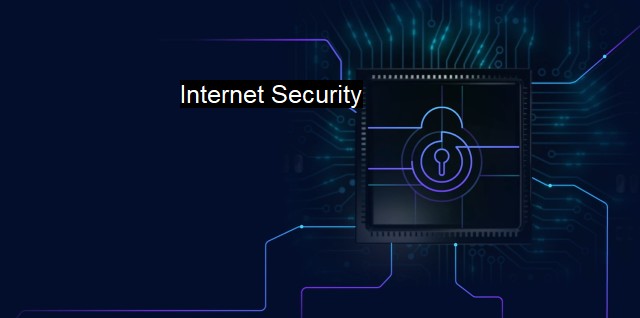What is Internet Security?
The Importance of Internet Security in the 21st Century: A Discussion on Cybersecurity and Antivirus Software
In the 21st century, Internet security has become one of the most important and discussed topics in the world. With every aspect of our lives now connected through the web, the threat posed by cybercriminals and online malware, particularly viruses, has grown exponentially.Internet security is a branch of computer science that deals with securing networks, devices, and data from cyber attacks. Cybersecurity refers to the protection of Internet-connected devices, such as computers, smartphones, and tablets, from malicious activities. Due to the rapid pace of technological advancement, there are a large number of risks associated with internet usage such as identity theft, credit/debit card fraud, phishing and various other forms of malware attacks such as viruses and Trojans, famous hacking incidents involving big corporations, and data breaches have become striking dangers than ever before.
There is a broad array of measures and tools implemented to help protect against these potential threats. These measures are collectively referred to as antivirus software. Antivirus programs provide a way to detect and remove virus-related malware hidden in software installations, documents, websites, emails and online communication channels that were designed to infect your device.
Antivirus software not only curtails the action of any existing virus existing in the system but also stops its spread by blocking infected new files from either being stored in the device or jumped to another synced networked device. A large number of well-known antivirus software developers are offering their unique, strong, and highly efficient packages towards both counter and prevention from existing and emerging vulnerabilities detected in newer online connected technologies at faster speeds.
Antivirus software tools adopted excellent expertise, composed of filtering mechanism integrated with real-time monitoring modes designed to capture originated malwares behin in its action, activities in modified browsers or programs, during payment and bank transactions in addition to tracking randomly generated digital names and signatures deriving from normal computing processes. Due to its intensive functionality, lightweighted and predetermined compatibility, antivirus software's bring excellent protection outcomes offered up by the higher choices of prime cybersecurity testing and review firms forming the testing authorities in cybersecurity.
Even with antivirus software in place, cybersecurity threats still exist. It is therefore important that every user of an IT system or internet aware enabled devices understand computer hygiene and safe web-utilization behaviors. This means educating oneself and adopting certain simple cybersecurity habits, like opting for network tight password activities making malware checks a priority frequently, regularly updating operating systems and staying alert to emails with fraudulent in-text bundles, messages, or links.
Other cybersecurity tips which can aid every device or users to optimize use using online content and transactions best include only downloading application and extension files from major recognized software authenticated for any desired function area one must wish to participate in, never opening suspicious advertisements in web pages or instantly accepting unknown file downloads from websites.
cybersecurity is an essential part of any business plan, can gravely implicate personal safety (along with privacy and online asset security) resulting in financial and perpetuating harm during internet banking especially Data breaches serve as a perfect example which marks the raw implication of careless and ignorant cyber habits. It is vital to implement the adequate and robust software defense tools functionality in any business plan as they help address security requirements at this tech--savvy era whilst simultaneously educating its users on safeguarding habits to fall into.

Internet Security FAQs
What is internet security and why is it important?
Internet security refers to the protection of internet-connected systems, including hardware, software, and data, from attack, damage, or unauthorized access. It is important because cyber threats are constantly evolving and becoming more sophisticated, making it essential to have robust security measures in place to prevent data breaches, identity theft, and other cybercrime.What are some common types of cyber threats?
Common types of cyber threats include malware (such as viruses, worms, and trojan horses), phishing attacks, ransomware, denial-of-service attacks, and social engineering scams.What can I do to protect my online devices and data?
There are several steps you can take to protect your devices and data online, such as keeping your software and operating system up-to-date, using strong and unique passwords, avoiding clicking on suspicious links or downloading files from untrusted sources, and using antivirus software and firewalls. Additionally, it is important to regularly backup your data and stay vigilant about monitoring your accounts for any suspicious activity.How can businesses ensure their cybersecurity measures are effective?
Businesses can ensure their cybersecurity measures are effective by conducting regular security assessments, implementing appropriate security policies and procedures, providing ongoing security training for employees, and investing in robust cybersecurity software and solutions. It is also important to have a response plan in place in case of a cyber attack or data breach. External Resources
| | A | | | B | | | C | | | D | | | E | | | F | | | G | | | H | | | I | | | J | | | K | | | L | | | M | |
| | N | | | O | | | P | | | Q | | | R | | | S | | | T | | | U | | | V | | | W | | | X | | | Y | | | Z | |
| | 1 | | | 2 | | | 3 | | | 4 | | | 7 | | | 8 | | |||||||